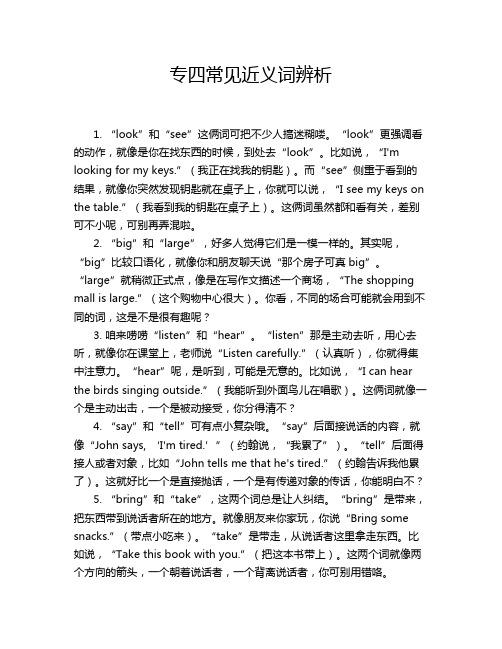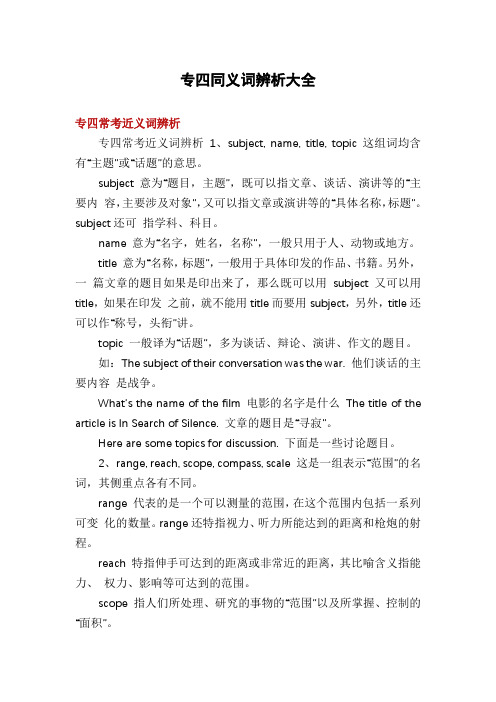专四近义词辨析精华版
专四近义词辨析精华版

专四近义词辨析精华版近义词是语言学中重要的研究内容之一,掌握近义词的用法和差别对于提高语言表达能力至关重要。
在英语专业四级考试中,近义词辨析也是常见的题型。
本文将为大家提供专四近义词辨析的精华版,希望能对大家备考有所帮助。
1. Accept vs ReceiveThe words "accept" and "receive" are often used interchangeably, but they have slightly different meanings."Accept" implies a willingness to take or agree to something, while "receive" simply means to be given or handed something. For example, you can "accept" an invitation to a party, indicating your willingness to attend, but you can also "receive" a gift from someone, without necessarily having a choice in the matter.2. Accomplish vs Achieve"Accomplish" and "achieve" both refer to successfully completing a task or reaching a goal, but there is a subtle difference in usage."Accomplish" refers to completing something with effort or skill, often over a period of time. For example, you can "accomplish" a project or a mission by putting in hard work and dedication."Achieve," on the other hand, implies reaching a desired outcome or result. It is often used in the context of personal or professional success. Forexample, you can "achieve" a goal or a dream by overcoming obstacles and persevering.3. Aid vs AssistBoth "aid" and "assist" mean to help or support someone, but there are slight differences in usage."Aid" often refers to providing assistance in the form of resources or supplies, especially in times of need or emergency. For example, countries may provide "aid" to regions affected by natural disasters."Assist" typically means to help or support someone in a specific task or action. It implies a more active involvement and direct contribution. For example, you can "assist" someone in writing a report by offering guidance and feedback.4. Conclude vs Determine"Conclude" and "determine" both involve arriving at a decision or a final outcome, but they have different connotations and usage."Conclude" implies reaching a decision or a judgment based on evidence, reasoning, or analysis. It often suggests a thoughtful and deliberate process. For example, you can "conclude" a research paper by summarizing the main findings and drawing logical deductions."Determine," on the other hand, suggests finding an answer or making a final decision through investigation, examination, or observation. It implies a more active and direct approach. For example, you can "determine" the cause of a problem by conducting experiments or analyzing data.5. Enormous vs ImmenseBoth "enormous" and "immense" mean extremely large or huge, but they are used in slightly different contexts."Enormous" is often used to describe size or amount, emphasizing the great magnitude or extent of something. For example, you can describe a skyscraper as "enormous" due to its massive size."Immense," on the other hand, suggests vastness or intensity, often in a figurative sense. It can describe something that is not necessarily physical, but has a profound impact or significance. For example, you can say that someone's contribution to a cause is "immense" because of its tremendous importance.In conclusion, mastering the distinction between near-synonyms is crucial for effective language proficiency. Understanding the nuances in meaning and usage of words like "accept" and "receive," "accomplish" and "achieve," "aid" and "assist," "conclude" and "determine," and "enormous" and "immense" will greatly enhance your ability to express yourself accurately and precisely in English. Keep practicing and expanding your vocabulary, and you will see significant improvement in your language skills.。
专四常见近义词辨析

专四常见近义词辨析1. “look”和“see”这俩词可把不少人搞迷糊喽。
“look”更强调看的动作,就像是你在找东西的时候,到处去“look”。
比如说,“I'm looking for my keys.”(我正在找我的钥匙)。
而“see”侧重于看到的结果,就像你突然发现钥匙就在桌子上,你就可以说,“I see my keys on the table.”(我看到我的钥匙在桌子上)。
这俩词虽然都和看有关,差别可不小呢,可别再弄混啦。
2. “big”和“large”,好多人觉得它们是一模一样的。
其实呢,“big”比较口语化,就像你和朋友聊天说“那个房子可真big”。
“large”就稍微正式点,像是在写作文描述一个商场,“The shopping mall is large.”(这个购物中心很大)。
你看,不同的场合可能就会用到不同的词,这是不是很有趣呢?3. 咱来唠唠“listen”和“hear”。
“listen”那是主动去听,用心去听,就像你在课堂上,老师说“Listen carefully.”(认真听),你就得集中注意力。
“hear”呢,是听到,可能是无意的。
比如说,“I can hear the b irds singing outside.”(我能听到外面鸟儿在唱歌)。
这俩词就像一个是主动出击,一个是被动接受,你分得清不?4. “say”和“tell”可有点小复杂哦。
“say”后面接说话的内容,就像“John says, ‘I'm tired.’”(约翰说,“我累了”)。
“tell”后面得接人或者对象,比如“John tells me that he's tired.”(约翰告诉我他累了)。
这就好比一个是直接抛话,一个是有传递对象的传话,你能明白不?5. “bring”和“take”,这两个词总是让人纠结。
“bring”是带来,把东西带到说话者所在的地方。
就像朋友来你家玩,你说“Bring some snacks.”(带点小吃来)。
专四同义词辨析大全

专四同义词辨析大全专四常考近义词辨析专四常考近义词辨析1、subject, name, title, topic 这组词均含有“主题”或“话题”的意思。
subject 意为“题目,主题”,既可以指文章、谈话、演讲等的“主要内容,主要涉及对象”,又可以指文章或演讲等的“具体名称,标题”。
subject还可指学科、科目。
name 意为“名字,姓名,名称”,一般只用于人、动物或地方。
title 意为“名称,标题”,一般用于具体印发的作品、书籍。
另外,一篇文章的题目如果是印出来了,那么既可以用subject又可以用title,如果在印发之前,就不能用title而要用subject,另外,title还可以作“称号,头衔”讲。
topic 一般译为“话题”,多为谈话、辩论、演讲、作文的题目。
如:The subject of their conversation was the war. 他们谈话的主要内容是战争。
What’s the name of the film 电影的名字是什么The title of the article is In Search of Silence. 文章的题目是“寻寂”。
Here are some topics for discussion. 下面是一些讨论题目。
2、range, reach, scope, compass, scale 这是一组表示“范围”的名词,其侧重点各有不同。
range 代表的是一个可以测量的范围,在这个范围内包括一系列可变化的数量。
range还特指视力、听力所能达到的距离和枪炮的射程。
reach 特指伸手可达到的距离或非常近的距离,其比喻含义指能力、权力、影响等可达到的范围。
scope 指人们所处理、研究的事物的“范围”以及所掌握、控制的“面积”。
scope的比喻含义指的是所掌握的知识的宽度,即“眼界,见识”。
compass 在意义上与scope相同,是正式用语,表示活动、兴趣、能力的“界限,范围”。
专四常考近义词辨析

管理control, direct, govern, manage, rule, supervise, administer 这些动词均有“打点、支配”之意。
control :普遍的常用词,指对人或物施以约束或节制的力量。
A captain controls his ship and its crew.(船主打点他的船和船上的船员。
)direct :着重行使率领或指导权。
The general manager directed the company through a difficult time.(总司理率领公司渡过了难关。
)govern :着重指运用任何节制的权力来统治或打点一个国家、一个社会或一个部门,暗含能力和常识的运用。
A king governs in that country.(那个国家由国王统治。
)manage :强调对具体事务机构进行打点,有时含受权打点或措置之意。
She managed a clothes shop two years ago.(两年前她开了一家服装店。
)rule : 强调挪用绝对或专制的权力来打点或统治。
The King ruled his people well and wisely.(这位国王英明地统治着他的臣民。
)supervise :着重指运用自己的或被授予的权力来打点、监督工作,含看管意味。
Tomorrow he will supervise all the pupils taking the Englishexamination.(明天全体学生考英语, 他将担任监考。
)administer : 指官方的或正式的对事务的打点。
They had the right to administer their own internal affairs.(他们有权摒挡自己的事务。
)协商consult, negotiate, confer这些动词均含“协商、筹议”之意。
2023年英语专四词汇易考形近词辨析50例

英语专四词汇易考形近词辨析50例1.adherence和adhesion这两个词都是“粘附的”意思。
adherence用于比方的意思。
adhesion是指物质上的。
例如:His adherence to the strict letter of the law.2.adjacent,adjoining和contiguous这些词都有next to“紧挨”的意思。
adjacent“毗邻的,邻近的”,但它们也许并不互相直接接触。
adjoining和contiguous指互相接触,通常之间有一个edge或boundary。
3.admission和admittance它们都有“the act of entering”的意思。
但admission用于公共场合。
The price of admission to the gallery is£5. admittance不指公共场合,一般指私人的住所。
4.adopted和adoptiveadopted“收养的,过继的”an adopted son(daughter)养子(女);my adopted country我所入籍的国家;adopted words外来语。
adoptive“收养的”,我们说adoptive parents,但很少说adoptive child;“采用的”,“假冒的”an adoptive courage假充勇敢。
5.adverse和averseadverse“不利的,反对的”,用于事,不用于人。
adverse weather conditions;an adverse reaction.averse“嫌恶的,反对的,不乐意的”,常和“to”一起使用,并且用否认形式。
6.advise和adviceadvise“劝告”(动词);advice“劝告”(名词)。
7.affect和effectaffect v.“影响”,它的第二个意思是“假装”Though she affectes indifference,I knew she was really very upset.effect n.“结果”,“效力”。
专四近义词辨析总结

专四近义词辨析总结专四近义词辨析总结随着英语专业四级考试的临近,在备考过程中辨析近义词是必不可少的一部分。
为了帮助考生更好地区分和理解这些近义词,下面将对一些常见的近义词进行总结和辨析。
1. English Language Tongue这是三个常用的表示“语言”的词汇,它们之间的区别在于语境和使用范围。
English是指英语这种语言,是英语国家和地区的通用语言;Language包括所有语言的总称,表示人类用来交流思想的工具,可以包括英语在内的多种语言;Tongue强调的是“舌头”的意义,有时候也可以用来指代某种语言。
2. Study Learn这两个词都表示“学习”的意思,但用法和语境略有差异。
Study更多地强调的是“学”有系统地掌握某种知识或技能,通常需要一定的时间和精力;Learn侧重于从相关经验、书籍、教育等途径中获取新的知识或技能,更侧重于过程。
3. Improve Enhance这两个词都表示“改善”或“提高”的意思,但用法有所区别。
Improve更常用于表示对已有的事物或情况进行改进,使之更好或更适合预期目标;Enhance则表示对已有的事物或情况进行提升,使之更加良好或更具价值。
4. Broaden Enlarge这两个词都表示“扩大”的意思,但用法和侧重点有所不同。
Broaden指的是概念或范围的扩大,也可以指某人的知识、眼界、视野的拓宽;Enlarged主要用来形容具体事物的体积、尺寸或规模的扩大。
5. Communicate Interact这两个词都表示“交流”的意思,但有着细微的差别。
Communicate强调的是信息或思想的传递和理解,可以是通过语言、书面、非语言或其他方式进行交流;Interact侧重于人与人之间的交流,强调的是相互之间的互动和影响。
6. Encourage Motivate这两个词都表示“鼓励”的意思,但使用上略有不同。
Encourage强调的是通过表扬、支持或鼓励使人获得自信和积极性;Motivate指通过激励和引导使他人产生行动的动机和动力。
专四备考:近义词辨析
近义词辨析1.beautiful, good-looking, handsome, lovely, prettygood-looking:Having an attractive appearance in a strong,healthy way used for men and women not things.beautiful:通用词,含义广泛,语气最强,指优美和谐,是一种几乎接近完美的美。
指人时通常形容女人或小孩,很少用于描写男子。
handsome:多用于描写男性的英俊潇洒。
有时也形容女人,指其五官端正,体态秀丽。
pretty:普通用词,语气比beautiful弱,多用于描写妇女、儿童以及小巧玲珑,精美可爱之物。
lovely:普通用词,描写人时,主要指女人和小孩的相貌,语气不如beautiful强fair:正式用词,形容妇女和儿童,侧重外表的美2.fast, hasty, quick, rapid, speedy, swiftfast: moving or able to move quicklyhasty:said,made or done very quickly,especially when this has bad results quick: done with speed; taking or lasting a short timerapid: happening in a short period of timespeedy: happening or done quickly or without delay (eg.a speedy recovery)swift:happening or done quickly and immediately; doing sth quickly(eg.a swift decision)3.break, crack, crush, shatter, break , smashBreak:常用词,含义广泛,多指猛然用力将坚硬物打破或损坏Crack:多指因长期使用或经受压力,物体表现呈现裂纹、裂口或破裂、裂开,但一般没成碎片。
英语专业四级考试近义词辨析
英语专业四级考试近义词辨析在学习专业英语词汇中,有时同义词的辨析是很不容易的,我们一般从三方面进展区分,即:语法、语义和文体。
语法主要是词性、搭配、句式等的区分;语义主要是词义的本义、引申义、比喻义和内涵和外延等的区分;文体主要是正式和非正式、褒义和贬义等的区分。
1.事情,事件(事) thing: An event, a fact, a subject. He talked of many interesting things.(事情) matter: Seth that you have to deal with, something to be discussed, thought over. There are several matters to be dealt with at the meeting.(事务责任) business: A special duty, something thathas to be done. Public business is every ones business.(事务) affair: An event or set of connected events. (pl) private and personal life. I have many affairs to look after.(事件) event: An important happening. Events such as birthdays and anniversaries are often celebrated. Do you know the chief events of 1986.incident: Not as important as an event. Incidents seldom are celebrated. Sometimes an event bees an incident after many years have passed.(偶然事件) happening: An ourrence, and sometimes an unusual one. There have been strange happenings here lately.(偶发事件) ourrence: An incident that is usually unexpected and has not been planned ahead of time. Flood is practically an annual ourrence in this district.。
专四同义词辨析
专四同义词辨析1.incident:突发性或相对而言不那么重要的事情。
event:重大事件或指体育比赛中的项目。
occurrence:计划,打算之外发生的事情occasion:时机,场合2.transform:改革,变革transport:运输transfer:传递,传送 transmit:发送(无线电)3.attack:发作(通常指疾病的发作)burst:爆发blast:爆炸4.campaign:运动(常用来表示政治性或商业性的活动或运动)5. roar:怒吼,轰鸣,咆哮scream:尖叫声whistle:耳语,私语exclamation:惊叫,欢呼声6.establishment:企业,设施(公司,学校,医院,教会)settlement:定居地,殖民地construction:建造,建筑物structure:构造,构造7.income:收入(泛指)wage:(体力劳动者)工资(按周领)salary:(白领人员)薪水(按月发)allowance:津贴,补助8.admission:常用于公共场所admittance:用于私人场所9.accurate:正确无误的,准确的(如天气预报,手表计算,射击)precise:准确的,明确的,细致的(如定义,细节,尺寸)exact:确切的,精确的(时间,数量,质量)10.variable:多变的,易变的(如雨量,气温)variation:变化,变更(数量,水平)variety:(同一事物的)不同种类,多种多样,多样化11.resident:居民,住户,(旅馆的)房客lodger:借宿者,寄宿者inhabitant:(某地的)居民settler:移民者,殖民者12.economical:节约的,节省的economic:经济上的,经济学的economy:经济economics:经济学13.waxy:蜡制的,似蜡的sticky:粘(性)的,棘手的,粘满果酱的greasy:①多油的,沾油脂的greasy fingers沾满油脂的手指②油腻的greasy chips油腻的炸薯条③油性的(头发或皮肤)long greasy hair 油性长发④(人或其行为)圆滑的,虚情假意的 a greasy smile假惺惺的笑容14.submissive:服从的,听话的dismissive:轻蔑的,鄙视的15.a patch of 一块••• a bunch of 一串,•, a packet of 一包,•, a pinch of 一撮•••16. spill:溅出,泼出 spoil:糟蹋,损坏 split:裂开,劈开17.关于•••,至于•••的表达 in regard to with regard to as regards as toin reference to with reference to18.strip①脱光,除去,剥去②(纸,金属,织物)条,带Cut the meat into strips 把肉切成条19.supply:向某人提供某物©supply sb with sth ②supply sth to sbprovide:向某人提供某物©provide sb with sth②provide sth for sb offer:向某人提供某物©offer sb . sth②offer sth to sb20 .minimal :最小的,最小限度的,极小的。
英语专业四级考试中的近义词辨析
英语专业四级考试中的近义词辨析英语专业四级考试中的近义词辨析英语专业四级考试中的近义词辨析英语专四考试中的词汇与语法题一直是很多考生头痛的题目,3000-4000个单词及其最基本的搭配,要在短时间内提高是很难的。
为此,我们为大家整理了15组专四近义词辨析,帮助大家更快掌握。
1、beat, win, conquer, defeat, overcome这组词均有“获胜,征服,击败”之意。
beat 指在战争、竞赛或其他方面最终彻底战胜对方,对象可以是人,也可以是物。
win 指在竞赛或战斗中击败对方,其对象一般应是物,如battle, race, victory等。
conquer 既可指靠武力或精神道方面的力量使对方屈服,又可指在排除障碍和阻力后取得胜利。
defeat 意为“击败”,强调的是暂时的胜利。
overcome 既可指在战斗和竞赛中战胜对方,也可指在感情、习惯等方面压倒,胜过。
如:We can easily beat you at baseball. 打垒球我们可以轻易地击败你们。
The Chinese team won in the end. 最后中国队赢了。
The Normans conquered England in 1066. 1066年,诺曼底人征服了英格兰。
He defeated his opponents in this election. 在这次竞选中,他击败了对手。
He made efforts to overcome every difficulty. 他努力克服每一个困难。
2、award, reward这组词均含有“授予,给予”的意思。
award 意为“授予,给予”,通常指官方或法院根据规定把钱财等奖给或判给某人。
reward 意为“酬劳,奖赏”,通常指因做了某一件事或提供了某种服务而应得到的报答或酬谢。
如:He was awarded a medal for his outstanding contribution to science. 由于对科学作出了杰出贡献,他被授予一枚奖章。
- 1、下载文档前请自行甄别文档内容的完整性,平台不提供额外的编辑、内容补充、找答案等附加服务。
- 2、"仅部分预览"的文档,不可在线预览部分如存在完整性等问题,可反馈申请退款(可完整预览的文档不适用该条件!)。
- 3、如文档侵犯您的权益,请联系客服反馈,我们会尽快为您处理(人工客服工作时间:9:00-18:30)。
近义词辨析1.abide, adhere, conform, comply这四个考试中的高频考词都有“遵守”的意思,但是它们的搭配不同。
abide v.后接by表示“遵守,同意”。
I will abide by the director' decision.我将遵从主任的决定。
adhere v.后接to表示“遵守”。
(当然adhere一词的其它意思如“坚持;粘附”也经常被考到。
)Car drivers must adhere to the rules of driving.汽车司机必须遵守驾驶规则。
conform v.后接to表示“遵守,符合”。
All individuals are required to conform to the laws made by their governments.每个人都应该遵守政府制订的法律。
comply v.后接with表示“遵守,服从”,用于正式的场合。
Our company complies with governmental regulations on payingtaxes.我们公司遵守政府有关纳税的规定。
2.abnormal, uncommon, disordered这三个单词都有“反常的”之意,在考研和CET-6当中经常让考生们辨析它们的细微差别。
abnormal a.不正常的,反常的(但并非罕见),指行为或现象(如气候)的异常。
His body temperature has been abnormal for 3 days, the highest point reaching 40.5 degreecentigrade.他的体温三天来一直都不正常,最高的时候达到40.5摄氏度。
(尽管身体发烧不正常,但生活中也时有发生。
)uncommon a.罕见的,不平常的,指很少经历或很少见到的状况;特别的,出色的。
Hurricanes are uncommon in England.飓风在英国非常罕见。
That is uncommon instant coffee; it tastes great!那速溶咖啡质量上乘,味道好极了!disordered a.混乱的,杂乱的;(精神或身体)有病的。
We couldn't understand her disordered presentation.我们听不明白她条理不清的陈述。
3.abolish, cancel, eliminate, dispose, erase, exclude, extinguish这一组动词都有“取消,除掉”的意思。
abolish v.指对法律、习俗、制度的废除;完全破坏。
The government abolished the tax on alcohol.政府取消了酒税。
cancel v.对预先安排的某种活动(如旅行、计划、会议等)的取消;删去(字、句)。
The meeting has been cancelled because of the flu.会议由于流感而取消了。
eliminate v.指消除、淘汰已经存在但是现在不需要的东西。
The losing team was eliminated from furthercompetition.失利的那个队被淘汰了,不能参加下一阶段的比赛。
The doctor helped him eliminate toxins from theintestine.医生帮助他排出肠中毒素。
dispose v.处理,处置;表示“除掉、扔掉”时常与of连用。
(这一点需要注意。
)After your picnic, please dispose of the litter.野餐后请清除掉垃圾。
erase v.除去,擦掉,指有意识地除去字迹、声音等。
I erased the music on the tape before recording on the tape again.我在往磁带上录音之前先消掉了上面的音乐。
exclude v.排斥;排除,不包括在内,与include互为反义词。
The restaurant excludes anyone who is not properly dressed from entering.衣冠不整者不得进入该餐馆。
extinguish v.熄灭,扑灭(火);使沉默,使暗淡。
Firefighters extinguished a big fire.消防队员扑灭了大火。
4.abstract, digest, outline, summary这一组名词都有“要点,摘要”的意思。
abstract n.概要,摘要,尤其指对学术论文或法律论据作的简述。
I have read the abstract of his book.我已经读了他的书的概要。
digest n. (篇幅较长的)摘要,文摘,它是对原文的浓缩而不是对原文的简单解释,浓缩后仍保持原文的顺序、重点和风格。
Reader's Digest《读者文摘》outline n.要点,大纲,概要。
She made an outline of ideas she wanted to present in her talk.她把自己要谈的想法列了一个提纲。
summary n.总结,摘要,指用寥寥数语概括文章或者讲话的要点,不考虑原文的风格。
5.absurd, ridiculous, silly这一组形容词都有“愚蠢,可笑”的意思。
absurd a.荒谬的,可笑的,指因不符合常识、违反真理或不合逻辑而令人发笑。
There was an absurd idea that the earth was flat and motionless.过去曾经有一种荒谬的观点认为地球呈扁平状而且静止不动。
ridiculous a.荒唐可笑的,指因为愚昧无知而令人发笑并成为笑柄,含有蔑视成分。
It is ridiculous to judge a foreign culture only by its food.仅仅根据一个国家的饮食来评价该国家的文化是荒唐可笑的。
silly a.愚蠢的,傻的,指由于单纯或者头脑简单而显得愚蠢。
a silly little boy傻小子6.abundant, plentiful这两个形容词都有“充足的”之意。
abundant a. (数量)充足的,常用于人、物产、资源、雨量等,含有“过多”之意。
Oil is in abundant supply in this country.这个国家石油供应十分充裕。
plentiful a.丰富的,充足的,常用于食物、收获、财产等,不能用于时间、空间、思想等方面。
Eggs are plentiful at this moment.现在鸡蛋很多。
7.accent, tone, dialect这三个名词意思相近,容易混淆。
accent n.口音,指某一地区语言的发音特征;重音。
He speaks English with a Spanish accent.他讲英语带有西班牙口音。
tone n.语气,音调,指说话人的口气或声音的高低、轻重等。
He speaks to his baby in soft tones.他用柔和的语调和他的婴儿说话。
dialect n.方言,土语,地方话,指一个地区人们所使用的语言。
the Yorkshire dialect约克郡方言the Sichuan dialect四川方言8.access, assess这两个词为一组“形近易混词”。
access n.接近,进入。
The people living in these apartments have free access to that swimming pool.住在这些公寓里的人可以免费地进入游泳池。
assess v.评估(财产,价值)。
I assessed how much it would cost to build a new apartment.我评估了一下建一套新的公寓要多少钱。
9.accommodate, afford, furnish这一组动词都有“提供”的意思。
accommodate v.提供住宿、房间;适应,迎合,迁就。
This hotel can accommodate up to 500 guests.这家饭店可供500位来宾住宿。
The company accommodated the customer's wish and sent the delivery overnight.公司满足了顾客的愿望,连夜将货物发了出去。
afford v.负担,支付;当“提供”讲时,多用于指抽象事物的提供。
We can't afford that expensive sports car.我们买不起那辆昂贵的跑车。
The tall building affords a beautiful view of the ocean.从这幢高楼上可以看到大海的美丽景致。
furnish v.指提供生活或某种用途所需要的东西。
Reading furnishes the mind only with materials of knowledge, it is thinking that makes what we read ours.阅读虽然为我们的思想提供了各种知识,然而只有思考才能将我们读到的内容变成自己的东西。
10.accomplishment, attainment, achievement这三个名词都有“成就”的意思。
accomplishment n.成功,成就;才艺,修养。
Climbing that high mountain was an accomplishment for the hikers.对于登山运动员来说,爬上了那座山就是成功。
Being able to paint well is just one of her accomplishments.画画得好只是她的许多才能之一。
attainment n.指学识和造诣(常用作复数);达到,到达。
a scholar of the highest attainments造诣极高的学者achievement n.可指抽象的“成就”,或具体的“成绩”,与accomplishment是同义词。
11.accuse, charge两个动词都有“控诉,指控”之意,但它们后面所搭配的介词不同。
accuse v.指控,控诉,与介词of连用。
The police accused him of theft.警察指控他犯有盗窃罪。
